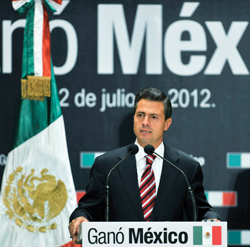
Back to the Future
It’s a huge story that impacts the lives of every person in Mexico. It represents a monumental shift in power, and introduces a new order of things. It gave the Mexican people something around which to rally, and sent thousands of them into the streets of the country’s major cities.
Mexico defeated Brazil in soccer at the Olympics!
What about the presidential election? That’s small potatoes to Mexicans at this point. Papas pequenas. The fact that Enrique Pena Nieto is taking the Institutional Revolutionary Party (PRI) back to power---after being “on the beach” for more than a decade, after Vicente Fox and the National Action Party (PAN) broke their 71 year grip on the presidency in 2000---seems almost anti-climactic.
On a 10-point scale measuring enthusiasm, the election is a «2,» while the Olympic gold medal is a «15.» And it›s not just because Mexicans prefer sports to politics. It’s about the three A›s: allegations, ambivalence, and anger.
Allegations: There’s a cloud over the election because the Party of the Democratic Revolution (PRD) and its presidential candidate Andres Manuel Lopez Obrador allege fraud on the part of the victorious PRI. Pena Nieto, the 45-year-old former governor of Mexico’s most populous state, got 38 percent of the vote. Lopez Obrador came in second with 31 percent. And, in a dramatic reversal of fortune for the party that took power 12 years ago but couldn’t keep it, the PAN’s Josephina Vasquez Mota got just 26 percent.
Lopez Obrador says those numbers are wrong, and that the PRI stole the election. That’s not exactly beyond the realm of possibility given the kind of shenanigans the PRI is alleged to have pulled in the 1988 and 1994 elections. Still, Lopez Obrador has no proof, and a reputation for a being a sore loser since he likewise complained about the outcome of the 2006 race that he lost to the PAN’s Felipe Calderon. The result is that there is no closure, only a huge question mark hovering over the election and lingering uncertainty about whether the declared outcome was legitimate.
Ambivalence: Many Mexicans seem ambivalent about who becomes president of Mexico. They don’t see a difference between the two major parties---the PRI and PAN. And if there’s one issue that drives that point home, it’s the drug war. For a while, it looked as if the PRI would call off the war, declare a truce with the cartels, and close a bloody chapter in the modern history of Mexico. The conflict has claimed the lives of more than 50,000 Mexicans.
The PRI racked up victories in the 2009 mid-term elections by promising prosperity and security. That was code for: “Elect us, and we’ll stop the war.” Things change. What started as an offensive by the government against the cartels morphed into a messy turf war. Now the PRI couldn’t stop the war, even if it wanted to. Besides, if you listen to what Pena Nieto has been saying in recent months about combating drug violence, it sounds a lot like what the Mexican people hear from Calderon and the PAN. Don’t expect a dramatic shift in the drug war or how the government wages it.
Anger: Always, in Mexican politics, there is the sense that the game is rigged. People get angry about that, and justifiably so. There are even those mega-cynics who believe that the PRI and PAN have worked a power-sharing relationship to keep control of the government away from the PRD. Under this scenario, the PRI went into a kind of exile to rebrand itself and purge the odor of corruption that was so palpable in 2000.
Two things helped fuel that cynicism. The first was that Pena Nieto led the polls, and won the presidency, despite a series of embarrassing episodes. Last year, he struggled at a literary fair in Mexico to name three books that influenced him. Later, in an interview with a Spanish newspaper, he admitted that he didn’t know the price of tortillas; when criticized for being out of touch, he said chauvinistically that he wasn›t «the woman of the household.» Lastly, he admitted in another interview that he was unfaithful to his late wife and fathered two children with two different women during his marriage. None of this hurt him.
And the second thing was that none other than Vicente Fox crossed party lines to endorse Pena Nieto---over the PAN’s own candidate, Vasquez Mota. For many Mexicans, that was proof that the two parties are in cahoots.
So where to now, Mexico? Exercising democracy means living with the consequences of your choices. By returning to power a party that was, not long ago, run out of office, Mexico chose to go back to the future. Now let’s hope it doesn’t go down the drain.
Ruben Navarrette, Jr.
